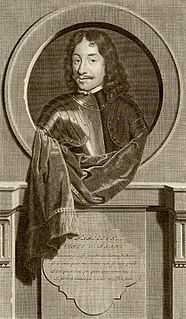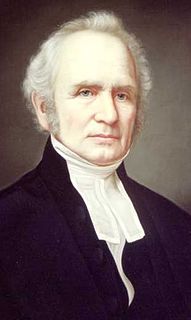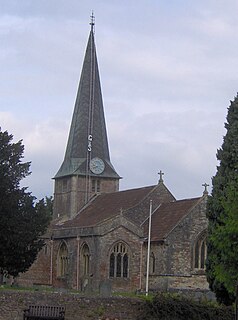Related Research Articles
The Acts of Supremacy are two acts passed by the Parliament of England in the 16th century that established the English monarchs as the head of the Church of England. The 1534 Act declared King Henry VIII and his successors as the Supreme Head of the Church, replacing the pope. The Act was repealed during the reign of the Catholic Queen Mary I. The 1558 Act declared Queen Elizabeth I and her successors the Supreme Governor of the Church, a title that the British monarch still holds.

Thomas Robinson, 1st Baron Grantham,, of Newby, Yorkshire, was a British diplomat and politician who sat in the House of Commons between 1727 and 1761.

James Hamilton, 3rd Earl of Arran (1537–1609) was a Scottish nobleman and soldier who opposed the French-dominated regency during the Scottish Reformation. He was the eldest son of James Hamilton, Duke of Châtellerault, sometime regent of Scotland. He was of royal descent, and at times was third or fourth in succession to the Scottish crown; several royal marriages were proposed for him, but he eventually never married. He went to France with Mary, Queen of Scots, and commanded the Scots Guards. After returning to Scotland, he became a leader of the Protestant party against Mary and her French supporters. However, he went insane in 1562 and was confined for the rest of his life.

The Lords of the Congregation, originally styling themselves "the Faithful", were a group of Protestant Scottish nobles who in the mid-16th century favoured a reformation of the church according to Protestant principles and a Scottish-English alliance.
William, Will or Bill Robinson may refer to:

Bath is a constituency in the House of Commons of the Parliament of the United Kingdom represented by Wera Hobhouse of the Liberal Democrats.

Whatley is a small rural village and civil parish near Frome in the English county of Somerset. Whatley is located near rural villages such as Chantry, Mells and Nunney.

Sir John Beverley Robinson, 1st Baronet, was a lawyer, judge and political figure in Upper Canada. He was considered the leader of the Family Compact, a group of families which effectively controlled the early government of Upper Canada.

West Harptree is a small village and civil parish in the Chew Valley, Somerset within the unitary district of Bath and North East Somerset. The parish has a population of 439.
Minehead was a parliamentary borough in Somerset, forming part of the town of Minehead, which elected two Members of Parliament (MPs) to the House of Commons from 1563 until 1832, when the borough was abolished by the Great Reform Act.

Sir John Thynne was the steward to Edward Seymour, 1st Duke of Somerset and a member of parliament. He was the builder of Longleat House and his descendants became Marquesses of Bath.
Matthew Montagu, 4th Baron Rokeby, FRS, 6th Bart., known as Matthew Robinson until 1776, was a British Member of Parliament, and briefly a baronet and Peer of the Realm.
Edmund Colthurst was a wealthy English landowner who inherited the former monastic estates of Hinton Priory and Bath Abbey, Somerset, following the death of his father in 1559. He was the son of Matthew Colthurst and Anne Grimston. He married Elinor de la Rivere, daughter of Thomas de la Rivere, with whom he had eight children.

William Laud, 7 October 1573 to 10 January 1645, was a priest in the Church of England, appointed Archbishop of Canterbury by Charles I in 1633. A key advocate of Charles's religious reforms, he was arrested by Parliament in 1640, and executed towards the end of the First English Civil War in January 1645.
Edward St. Loe or Seyntlowe, of Sutton Court, Somerset and Knighton, near Ramsbury, Wiltshire, was an English politician.
Richard Gay, of Walcott Street and Westgate Street, Bath and Claverton, Somerset, was an English politician.

Edmund Wright of Sutton Hall in the parish of Burnt Bradfield in Suffolk and of Buckenham Tofts in Norfolk, was a Member of Parliament for Steyning in Sussex in 1559.
References
- ↑ "ROBINSON, William I, of Bath, Som. - History of Parliament Online". historyofparliamentonline.org.
| This article about a 16th-century Member of the Parliament of England is a stub. You can help Wikipedia by expanding it. |